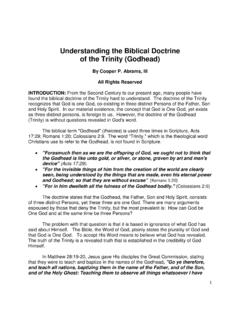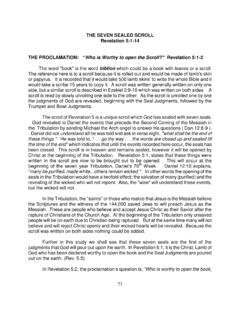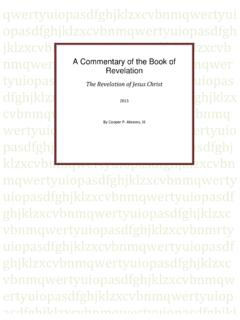Transcription of Christ Speaks to Seven Churches in Asia Minor - Bible Truth
1 1 Christ Speaks to Seven Churches in asia Minor AThe Things Which Are@ Revelation 2-3 Bible Truth Web Site - by Cooper Abrams Revelation Chapters 2-3 begin the section that deals with situation in the day that John wrote the book. It addresses "the which are" of Revelation 1:19. The Seven Churches mentioned here are literally Seven Churches that existed at the time of the writing of the book and were located in asia . In these two chapters the Lord gives Seven messages to the Churches . Although these messages were challenges to these specific Churches , by application they are directed toward Churches throughout history. The strengths that Christ commended are strengths Churches should embrace, and their failures should be a strong warning to diligence in faith and practice. As with the Epistles Christ s message surely given to all Churches and was applicable to all the hundreds of Churches in asia .
2 Their dedication to the Lord and also the problems in these Churches are common to all Churches . The characteristics of these Seven Churches appear to be prophetic. An examination of church history shows the distinctiveness of each of these Seven church parallels the trends in the Churches in the following centuries. The Seven Churches and their corresponding ages:1 Ephesus (Rev. 2:1-7) (30-100 AD) The First Century Apostolic church. Smyrna (Rev. 2:8-11) (100-313 AD) The Age of Roman Persecution Pergamos(Rev. 2:12-17) (313-600) The Age of Constantine Thyatira (Rev. 2:18-29) (600-1517 AD) The Dark Ages Sardis (Rev. 3:1-6) (1517-1648 AD) The Protestant Reformation Philadelphia (Rev. 3:7-13) (1648-1900sAD) The Missionary Movement Laodicea (Rev. 3:14-22) (1960 to Present) The Age of Apostasy prior to the Rapture Surely, throughout each century there have been Churches with the characteristics of these Seven Churches .
3 However, the general trend is apparent that the general types of Churches in Chapters 2-3 correspond to each of these Churches . EPHESUS: BUSY BUT BACKSLIDDEN AND WITHOUT LOVE. Revelation 2:1-7 THE HISTORICAL SITUATION AT EPHESUS: ("Ephesus" means "desirable") 1 Adatped from Arnold G. Fruchtenbaum, The Footsteps of Messiah, rev ed. (Tustin, CA: Ariel Ministries, 2003), 48-49. 2 Ephesus was an apostolic2 church of the First Century and was a prosperous Roman trade city located on the Aegean Sea. Its business centered on worldwide sea trade due to its sheltered inland harbor. Today the city is but a ruin. Heavy timbering and over grazing of land eroded its top soil which was carried into the Cayster River and deposited in the bay the city was built by. They tried by dredging to clear the waterways, but failed.
4 In time the river filled up the bay and it became a reed marsh. Today the ruins of the city are 12 miles inland. The city that occupies the area today is the Turkish town called Ayasaluk. Ephesus was in the beginning a spiritually strong church and Acts 20:31, records that Paul spent three years there teaching and preaching. Timothy was pastor of Ephesus during Paul's imprisonment and martyrdom in Rome. Historians record that Timothy suffered at Ephesus the same martyrdom as Paul at Rome. Later, the Apostle John ministered at Ephesus and was exiled from there to the Island of Patmos. Polycarp, who was a disciple of John, was a faithful leader in this church. He too gave his life for Christ in that city. It was an evangelistic church sending missionaries to other areas and was a very busy and outwardly prosperous.
5 Others who faithfully served the Lord and worked at Ephesus were Aquila, Priscilla and Tychicus. (Acts 18:2, 18, 20:4, 26; Rom. 16:3; Eph. 6:21, 24; Col. 4:7, 18; 2 Tim. 2:12: Titus 3:12) The church at Ephesus was constantly plagued by Satan's attacks and by the problem of the saved but immature Gentiles who continued to walk after the world. (Eph. 5:2-17) Their unfaithfulness was robbing the church of God s blessings. Ephesians 5:6 indicates there were false teachers in the assembly who were also teaching that sinning was all right with God. Timothy was battling a host of problems including false doctrine. John later opposed the false doctrines of Nestorius and Gnosticism who also plagued this church. This church is an example of the diligence of Satan in assaulting a church which is seeking to serve the Lord. The city was located in the middle of pagan land where false religion dominated the culture.
6 The idol goddess Diana's (Artemis) temple was there which was called one of Seven Wonders of the World. This temple and others made it a tourist city and part of its great industry was selling souvenirs and small idols. The pagan religion of the city was very rich and influential. When Paul first preached in Ephesus many people believed in Christ and sale of idols and pagan religious items dropped off. Those who made the idols, upset by the loss of business, caused the riot mentioned in Acts. 19:25-27. Christ HOLDS THE PASTOR AND CHURCH RESPONSIBLE FOR LEADERSHIP. Rev. 2:1 2 The word Aapostolic" relates to the Apostles. It refers to the first Churches established by the Apostles and the time period in the 1st Century when the apostles were living. 3 Letter is addressed to the church through its pastor.
7 The word "angel" means "messenger." The word doesn't mean an angel as heavenly being, but it simply identifies one as the "messenger. It is important to note that the pastors derive their message from Christ . A church is ruled by Christ who is its Head and He brought it with His own blood. (Eph. 5:23, 25) The church that follows Christ will have no problem honoring and following God's messengers who faithfully preach the Word of God and follow the Lord. Addressing the message to the pastor is putting him in the proper perspective as the overseer of the church. God reveals the ministry of a pastor in 1 Peter 5:1-3. Feed the flock of God which is among you, taking the oversight thereof, not by constraint, but willingly; not for filthy lucre, but of a ready mind; Neither as being lords over God's heritage, but being ensamples to the flock. (1 Peter 5:2-3) A pastor does not rule a church, but follows God s word in leading the congregation in worshipping and serving the Lord.
8 The elder, bishop, pastor are various names the New Testament gives to the overseer that God sends to a local church to set the example and lead it. The New Testament is clear in that God instituted congregation rule as the biblical polity in a church. Many preachers amass great power and glory unto themselves and the people allow it. But it is wrong for a church to esteem its messenger to the point he over shadows Christ and the Word of God. It is also just as wrong to show little esteem and respect for a pastor or recognize him as God's messenger. (See 1 Tim. 5:17) The pastor is to be the leader or overseer of the church as New Testament clearly states. He is not to be a lackey of the congregation, nor should he lord over the flock. (1 Tim. 1:18-19; 4:16,12; 5:20:22; 6:3-5,17; 2 Tim. 1:8, 13; 2:2-3, 14; 3:5; 4:1-5; 1 Peter 5:7) Many Churches and pastors allow a group of elders, deacons, trustees or committees to rule over a church.
9 Many Churches and denominations are ruled be an outside hierarchy of rules who exercise authority over a church. Nowhere in scripture is this found and in fact God expressly denounces this as He did in Ephesus commending the Nicolaitans. The point can be made here that God did not speak to any individual or group in the Churches , but spoke directly to the pastor whom he had appointed as their leader. Ideally the congregation is made up of born again believers who are in fellowship with the Lord and are spiritually mature. Being spiritually sensitive to the Holy Spirit they properly cooperate with the overseers of the church and jointly they do God s will. The precedent is firmly established that God spoke to the church through their pastor that He through the Holy Spirit had set over the congregation.(Acts 20:28) A church that ignores this principle of Scripture is outside of God's will.
10 God is not pleased nor will bless those who do not listen and follow His messengers. Throughout the history of Israel their rebellion against God was directed toward God's messenger. (See Acts 7:52, Heb. 11:35-40) Often those whom God had not called tried to elevate themselves into that position. Miriam and Aaron rebelled against Moses' leadership falsely concluded that they were better qualified to lead Israel. However in spite of Moses' shortcoming God's choice was Moses. (Numbers 12:1-16) God struck them down for their arrogance and disobedience. 4 Korah also rebelled against Moses saying, "Ye take too much upon you, seeing all the congregation are holy, every one of them, and the Lord is among them: wherefore then lift ye up yourselves above the congregation of the Lord?" (Num. 16:3) He argued that all the congregation of Israel did not need Moses and without God's approval he proceeded to take the leadership of Israel upon himself.




